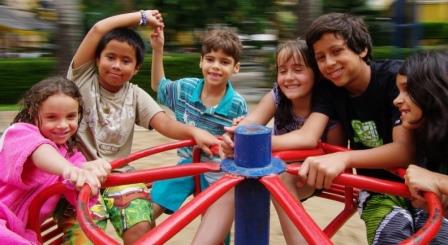Time To Play Everyone – It’s National Playday!

Play can seem like such a simple act. But did you know that it is in fact of fundamental importance to the health of each and every child?
National Playday, held on the first Wednesday of August, celebrates children’s right to play as well as highlighting the importance of play in children’s lives. So we thought we’d have a little celebration too – right here!
What is play?
Play is what children and young people do when they follow their own ideas and interests, in their own way, and for their own reasons.
Playday defines play as a “generic term applied to a wide range of activities and behaviours that are satisfying to the child, creative for the child and freely chosen by the child. Children’s play may or may not involve equipment or have an end product. Children play on their own and with others. Their play may be boisterous and energetic or quiet and contemplative, light-hearted or very serious.”
Each child has a right to rest and leisure, to engage in play and recreational activities appropriate to the age of the child and to participate freely in cultural life and the arts.
Why is play important?
Play is an essential part of every child’s life. It is vital for the enjoyment of childhood as well as for social, emotional, intellectual, educational, behavioural and physical development and well-being. When children are asked about what they think is important in their lives, playing is usually at or near the top of the list.
In addition to improving health and quality of life, recent research suggests that children’s access to good play provision can:
- increase their self-awareness, self-esteem, self-worth and self-respect – skills which they require in order to continue building loving and supportive relationships all their lives
- improve and maintain their physical and mental health and keep them physically active
- give a child a sense of his or her own abilities and enable them to develop these
- give them an opportunity to mix with other children, helping to improve social, communication and co-operation skills
- give them space
- allow them to increase their confidence through developing new skills
- promote their imagination, learning, spontaneity, independence, self-expression and creativity and give them freedom to choose what they want to do
- offer opportunities for children of all abilities and backgrounds to play together
- build resilience through risk taking, challenge, problem solving, and dealing with new situations
- provide opportunities to learn about their environment and the wider community
- lay the foundation for excellent literacy
- develop their ability to concentrate as they often become very absorbed in what they are doing
- increase the fun in children’s lives – learning to play well, both by themselves and with others, sets children up to be contented and sociable
- show children that they are loved, important and fun to be around, helping them to feel good about themselves
Research also outlines the wider benefits of play provision for adults, families and communities, suggesting that play:
- encourages adults to communicate with the children in their lives
- encourages strong bonds between the adult and the child
- in families encourages strong family bonds – the interactions that occur through play tell children that parents are fully paying attention to them and help to build enduring relationships
- leads to healthier, happier children
- is important for adults too as it gives adults the chance to learn how to play again, is great for destressing, can be restful and helps adults enjoy their children
- allows adults to learn a child’s body language and sense when children want them to join the play
- teaches adults patience and understanding – if an adult chooses to join in a child’s play, they must not try to take it over and force incorporation of ultimate learning objectives into the play. Structured adult-led activities have their time and place but adults must remember to allow time for children to control and decide their own play.
- buildings and facilities used by play services are a focal point for communities
- offers opportunities for social interaction for the wider community and supports the development of a greater sense of community spirit, promoting social cohesion
- in outside public spaces, including parks and green spaces, has an important role in the everyday lives of children and young people
Good quality play can be simple to achieve. If you would like some great (yet easy!) ideas for effective ways to play, and to learn more about typical pitfalls to avoid with play in today’s world, please click here to view Part 2 of our Play blog article. And of course, make sure to make an extra special effort to play today to celebrate National Playday!
For more about Playday, visit http://www.playday.org.uk/about-playday
If you have any worries about a child’s health and would like to book an appointment with one of our experienced GPs, please call 01962 828715 or email info@thewalcotepractice.co.uk.


